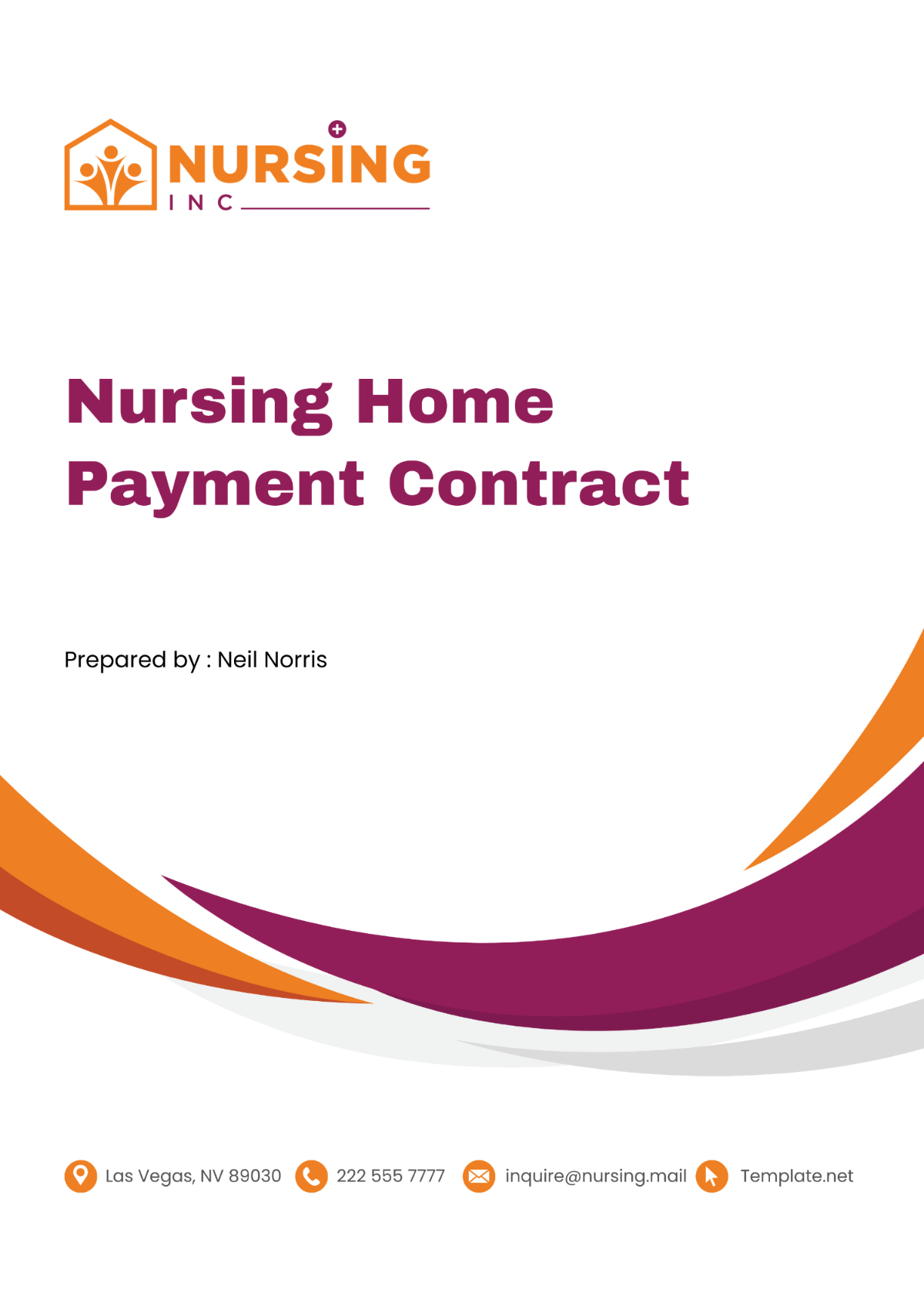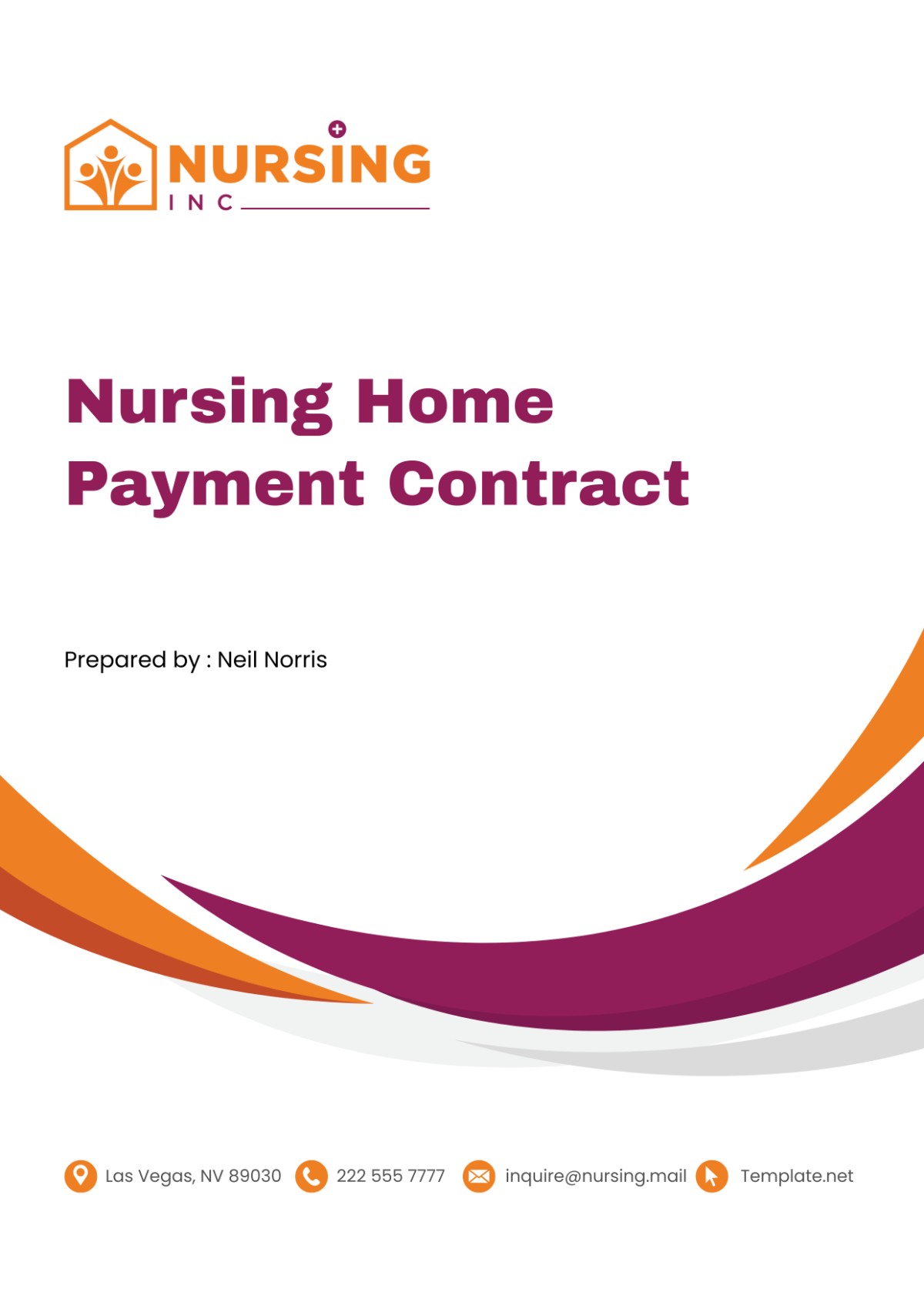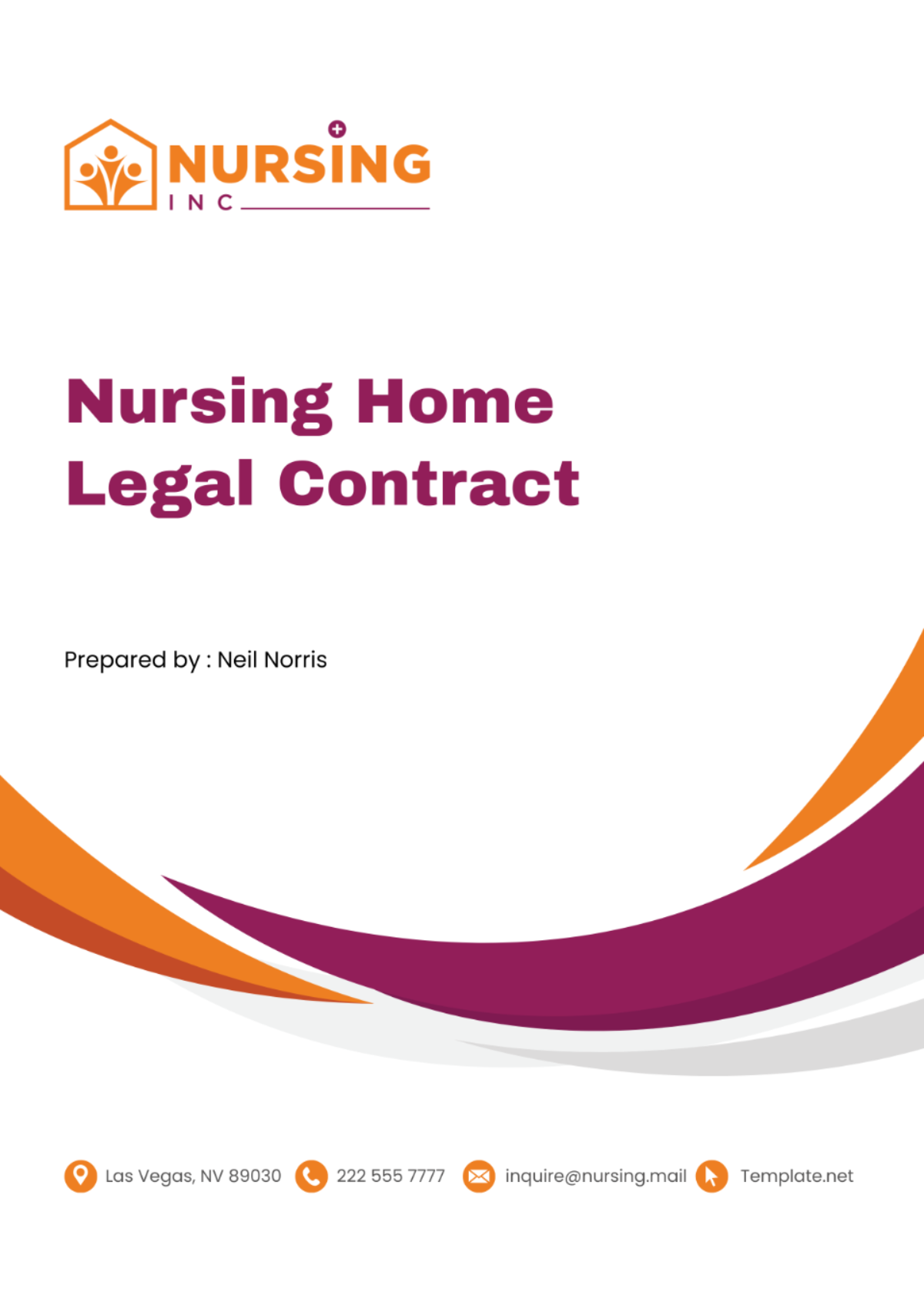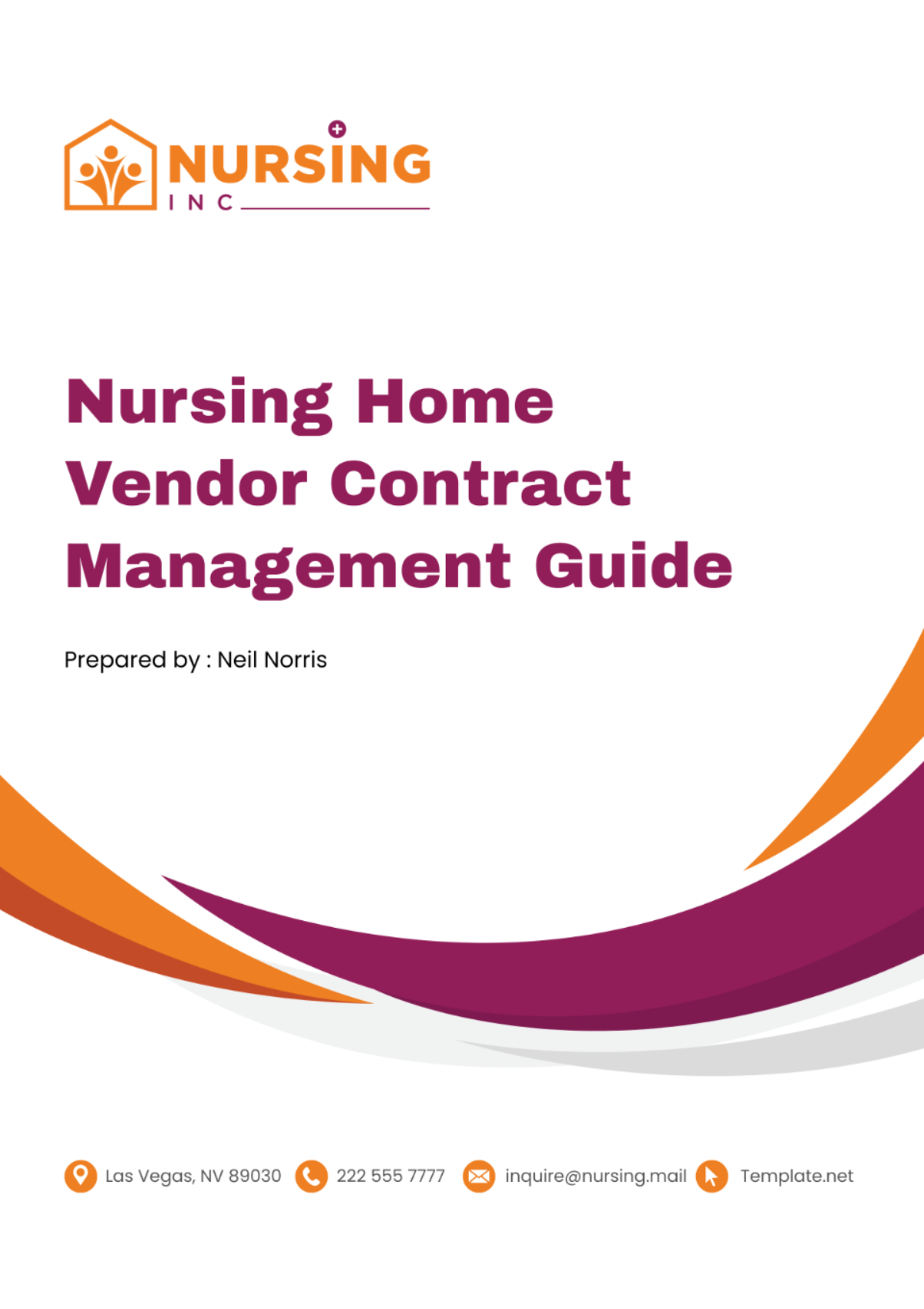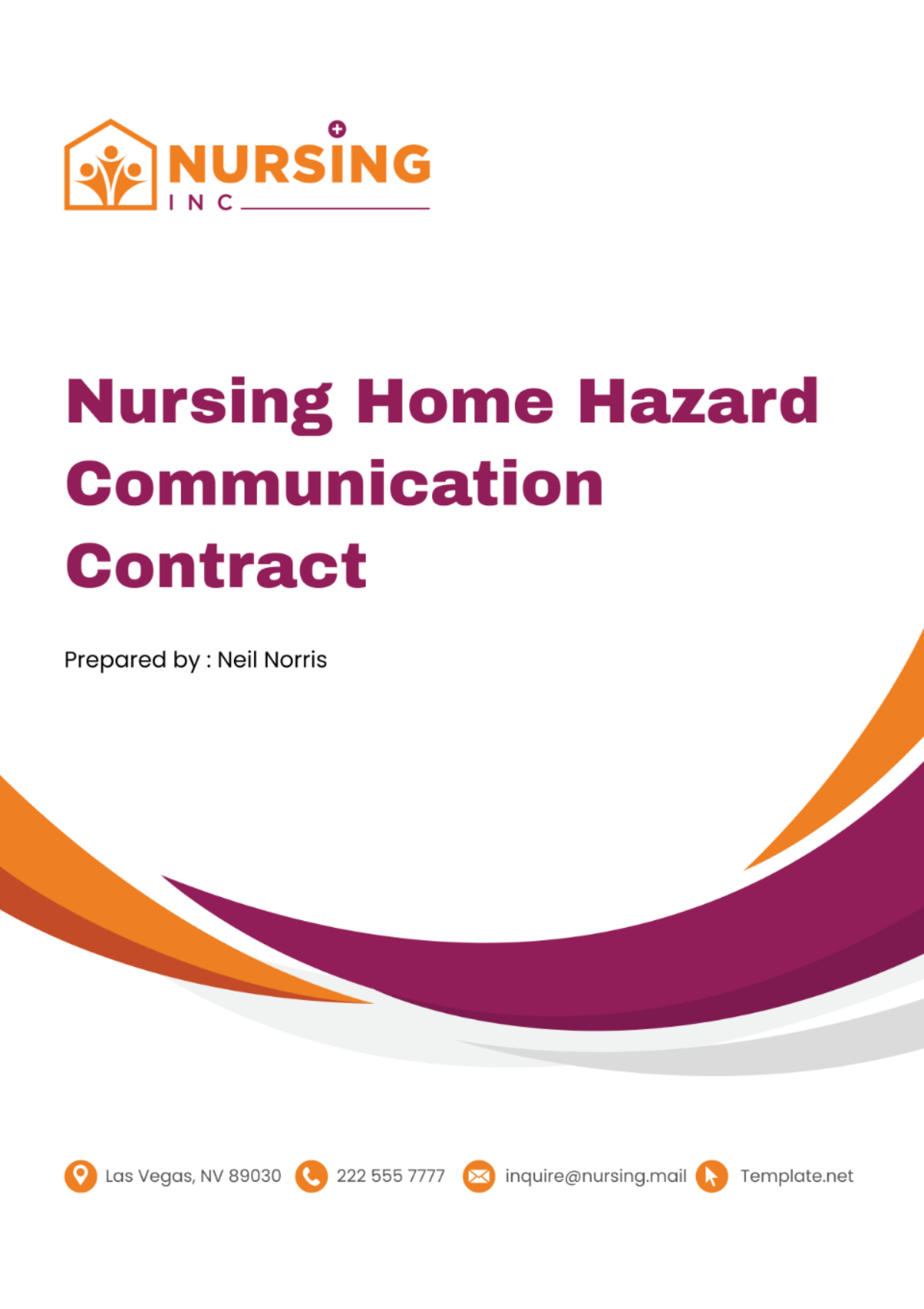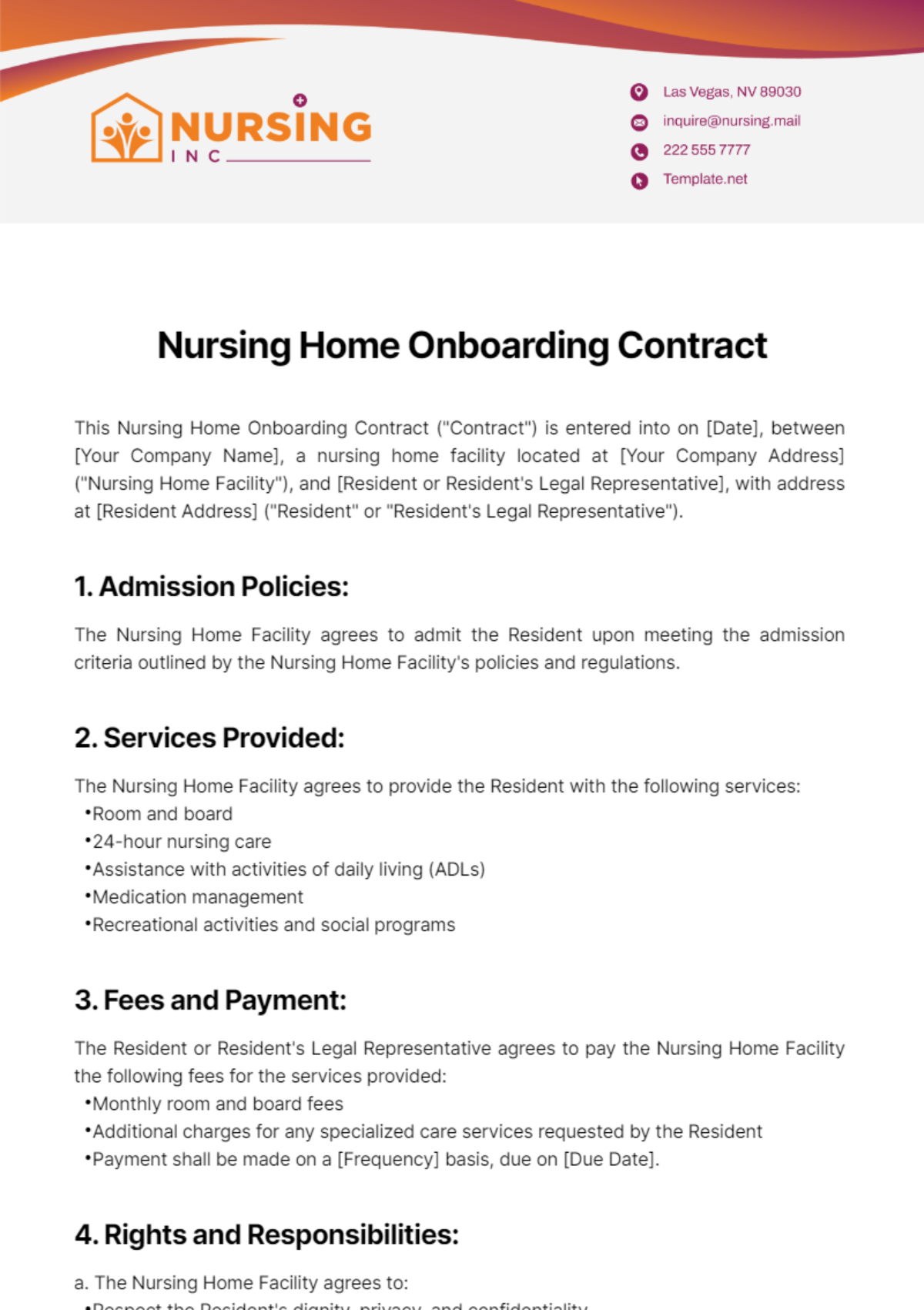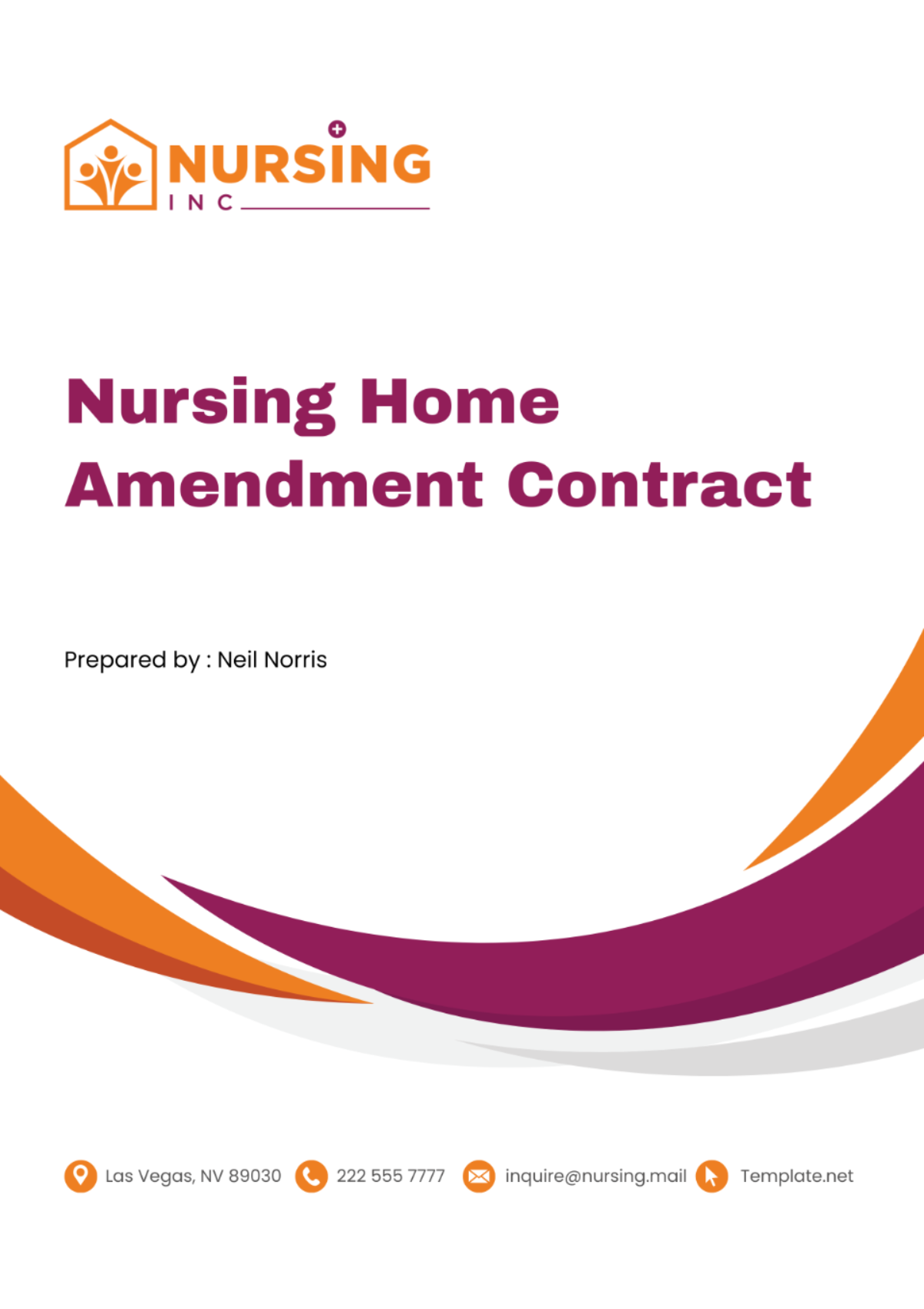Nursing Home Quotation Contract
I. The Parties
This Nursing Home Quotation Contract ("Contract") is entered into this day of [Month Day, Year] (the "Effective Date"), by and between [Your Company Name], headquartered at [Your Company Address] ("Provider"), and [Resident's Name], an individual residing at [Resident's Address] ("Resident"), collectively referred to as "Parties".
WHEREAS, the Provider is engaged in the business of providing nursing home services and has the necessary qualifications, experience, and abilities to provide such services;
WHEREAS, the Resident is in need of such services and has approached the Provider to provide the services;
WHEREAS, the Provider agrees to provide such services to the Resident subject to the terms and conditions set forth in this Contract;
NOW, THEREFORE, in consideration of the mutual covenants contained herein and for other good and valuable consideration, the receipt and sufficiency of which is hereby acknowledged, the Parties agree as follows
II. Services
The Provider is committed to delivering a comprehensive range of nursing home services to the Resident. These services are designed to ensure the Resident’s comfort, health, and well-being during their stay at the nursing home. The services include, but are not limited to:
A. Board and Lodging
Comfortable and Safe Living Environment: The Provider will ensure the provision of a comfortable and safe living environment for the Resident. This includes a private or semi-private room that is clean, well-maintained, and furnished to meet the Resident’s needs.
Housekeeping and Maintenance: Regular housekeeping and maintenance services will be provided. This includes daily cleaning, laundry services, and prompt attention to any necessary repairs or adjustments to ensure the Resident’s comfort and safety.
Nutritious Meals: The Provider will provide three nutritious meals a day, tailored to the Resident’s dietary needs and preferences. Snacks and beverages will also be available throughout the day.
B. Inclusive Healthcare
Regular Health Assessments: The Provider will conduct regular health assessments to monitor the Resident’s health status. These assessments will be conducted by qualified healthcare professionals and will include routine check-ups and necessary medical tests.
Medication Administration: The Provider will ensure the proper administration of prescribed medication. This includes monitoring for side effects and interactions, and coordinating with the Resident’s healthcare providers as necessary.
Specialized Care Coordination: The Provider will coordinate with healthcare professionals for specialized care as needed. This includes arranging appointments, transportation, and follow-up care.
C. Nursing Care
24/7 Nursing Staff Availability: Qualified nursing staff will be available 24/7 to provide care and assistance to the Resident. This includes responding to emergencies, managing health conditions, and providing comfort and support.
Assistance with Daily Living Activities: The Provider will assist the Resident with daily living activities such as bathing, dressing, and eating. This assistance will be provided in a respectful and dignified manner, respecting the Resident’s independence and personal preferences.
Health Condition Management: The Provider will manage any health conditions or illnesses the Resident may have, in coordination with the Resident’s healthcare providers. This includes monitoring symptoms, administering treatments, and adjusting care plans as necessary.
D. Rehabilitation Services
Access to Therapy Services: The Resident will have access to physical, occupational, and speech therapy services as needed. These services will be provided by qualified therapists and will be tailored to the Resident’s individual needs and goals.
Personalized Rehabilitation Plans: The Provider will develop and implement personalized rehabilitation plans for the Resident. These plans will be based on the Resident’s health status, abilities, and rehabilitation goals.
Regular Progress Assessments: The Provider will conduct regular progress assessments and make adjustments to the rehabilitation plan as necessary. This ensures that the Resident’s rehabilitation needs are being met and that they are making progress towards their goals.
E. Social Activities
Social and Recreational Activities: The Provider will organize a variety of social and recreational activities for the Residents. These activities will be designed to promote social interaction, mental stimulation, and overall well-being.
Encouragement of Participation: The Provider will encourage Resident participation in activities. This includes providing necessary assistance and adaptations to ensure that all Residents can participate and enjoy the activities.
Regular Updates to Activities Schedule: The Provider will regularly update the activities schedule based on Resident feedback and interests. This ensures that the activities offered are engaging, enjoyable, and beneficial to the Residents.
III. Quotation
The Provider is committed to providing high-quality care and services at a fair and transparent cost. The following quotation outlines the fees associated with the services provided. These costs are carefully calculated based on the range of services provided, the level of care required by the Resident, and the duration of the Resident’s stay:
Service | Description | Cost |
|---|---|---|
Board and Lodging | Includes accommodation, housekeeping, and meals | $2,000 |
Inclusive Healthcare | Regular health assessments, medication administration, and specialized care coordination | $1,500 |
Nursing Care | 24/7 nursing staff availability, assistance with daily living activities, and health condition management | $1,800 |
Rehabilitation Services | Access to therapy services, personalized rehabilitation plans, and regular progress assessments | $1,200 |
Social Activities | Organization of social and recreational activities | $500 |
Total | $7,000 |
IV. Payment Terms
A. Total Payment
Quoted Amount: The total quoted amount for the services provided is detailed in the contract. This amount is based on the comprehensive range of services provided to the Resident, ensuring a complete understanding of the financial commitment.
Payment Structure: The total quoted amount is to be paid in a lump sum, as mutually agreed upon by the Parties. This structure ensures a straightforward and simplified payment process, eliminating any potential confusion or misunderstanding.
Additional Costs: Any additional costs, such as those for extra services requested by the Resident, will be communicated to the Resident in a timely manner and added to the total quoted amount. This ensures transparency and allows the Resident to plan their finances accordingly.
B. Payment Schedule
Due Date: The payment is due on the [Month Day, Year] as specified in the contract. This date has been chosen to align with the Resident’s financial schedule, ensuring convenience and ease of payment.
Payment Reminder: The Provider will send a reminder to the Resident prior to the Payment Date to ensure timely payment. This proactive approach helps prevent any oversight or delay in payment.
Late Payment Consequences: Any payments not received by the due date is subject to [1.5%] of the overdue amount. These fees are in place to encourage timely payments and to cover the administrative costs associated with late payment tracking.
C. Payment Method
Accepted Methods: The Provider accepts payments through various methods, such as check, bank transfer, or credit card. This variety of payment methods is offered to make the payment process as convenient as possible for the Resident.
Receipt of Payment: The Provider will acknowledge receipt of each payment and provide the Resident with a record of the transaction. This ensures that both Parties have a clear and accurate record of all payments made.
Discrepancies: Any discrepancies in payment amounts or methods should be reported to the Provider immediately for resolution. The Provider is committed to resolving any such issues promptly and fairly.
D. Refunds and Cancellations
Refund Policy: In the event of overpayment or if the Resident discontinues the use of services before the end of the payment period, the Provider will issue a refund. The refund will be calculated on a pro-rata basis for the unused portion of the services.
Cancellation Policy: If the Resident wishes to cancel the contract, they must provide a written notice to the Provider. Upon receipt of the notice, the Provider will calculate any outstanding fees for services already provided and issue an invoice or a refund, as applicable.
Changes in Services: If there are any changes in the services provided that result in a change in the total amount due, the Provider will adjust the payment terms accordingly and inform the Resident in a timely manner.
V. Default
A. Failure to Make Payment
Due Date: The Resident is required to make the payment by the due date as specified in the contract. This ensures that the Provider can continue to deliver the services without interruption.
Payment Reminder: The Provider will send a reminder to the Resident prior to the due date to facilitate timely payment. This is a proactive measure to prevent any oversight or delay in payment.
Consequences of Non-Payment: If the Resident fails to make the payment by the due date, it will be considered a default on the contract.
B. Contract Termination
Right to Terminate: In the event of a default, the Provider reserves the right to terminate this Contract. This is to protect the Provider’s interests and ensure the sustainability of its services.
Claim of Amounts Due: Upon termination, the Provider has the right to claim any amounts due at the time of termination. This includes the cost of services already provided and any additional costs incurred.
Notice of Termination: The Provider will provide a written notice of termination to the Resident, outlining the reasons for termination and the amounts due.
C. Legal Remedies
Seeking Legal Remedies: If necessary, the Provider may seek relevant legal remedies to recover the amounts due. This is a last resort and will only be pursued after all other avenues have been exhausted.
Legal Costs: Any legal costs incurred in the process of recovering the amounts due will be the responsibility of the Resident.
Resolution: The Provider is committed to resolving any issues amicably and will make every effort to avoid legal proceedings.
VI. Confidentiality
A. Definition of Confidential Information
Scope of Information: Any information, regardless of the way it is presented or communicated, obtained directly or indirectly under this Contract. This includes, but is not limited to, written or oral contracts, trade secrets, know-how, business methods, business policies, memoranda, reports, records, computer retained information, notes, or financial information.
Explicit Designation: Any information that is designated as confidential at the time of disclosure. This includes any information which is provided in writing and marked as confidential, or if provided orally, is confirmed in writing as confidential within a reasonable time period following disclosure.
Implicit Confidentiality: Any information that, by the nature of the circumstances surrounding the disclosure, ought in good faith to be treated as confidential. This includes information that is not explicitly stated as confidential but could be detrimental to either party if disclosed.
Business Operations: Any documents, data, materials, or information related to the operations, business, financial affairs, products, services, or potential business development opportunities of either party.
B. Obligations of the Parties
Maintaining Confidentiality: Both parties shall keep the confidential information in strict confidence. They should take all necessary precautions to prevent any form of leakage, unauthorized access, or disclosure of the confidential information.
Non-Disclosure: The parties shall not disclose the confidential information to any third parties. They should not use the confidential information for any purpose other than to fulfill their obligations under this Contract.
Limited Use: The parties shall use the confidential information solely for the purpose of this Contract. They should not use the confidential information for their own benefit or the benefit of others without the prior written consent of the other party.
C. Exceptions to Confidentiality
Public Knowledge: Information that is publicly known at the time of disclosure or subsequently becomes publicly known through no fault of the Receiving Party.
Prior Knowledge: Information that is discovered or created by the Receiving Party before disclosure by Disclosing Party.
Third Party Information: Information learned by the Receiving Party through legitimate means other than from the Disclosing Party or Disclosing Party’s representatives.
Consent to Disclose: Information that is disclosed by Receiving Party with Disclosing Party’s prior written approval.
D. Legal Requirements and Ethical Obligations
Legal Disclosure: In the event that Receiving Party is required by law to disclose any of the Confidential Information, the Receiving Party agrees to give Disclosing Party prompt written notice of such requirement so that the Disclosing Party may seek a protective order or other appropriate remedy.
Limited Disclosure: If such a protective order or other remedy is not obtained, the Receiving Party shall furnish only that portion of the Confidential Information which it is legally required to disclose.
Compliance with Laws: Both parties agree to comply with all applicable laws and regulations in their use and handling of the Confidential Information.
Ethical Standards: Both parties agree to adhere to ethical standards and practices in their use and handling of the Confidential Information.
Reporting Misuse: Both parties agree to report any unauthorized disclosure or misuse of the Confidential Information to the other party as soon as they become aware of it.
Cooperation: Both parties agree to cooperate in any investigation or legal action necessary to protect the Confidential Information.
VII. Term and Termination
A. Contract Duration
Commencement: The contract will commence on the date it is signed by both parties. This is the official start date of the contract.
Expiration: The contract will remain in effect until [Month Day, Year], unless terminated earlier by either party. This is the official end date of the contract.
Contract Period: The period between the start date and the end date will be considered as the contract period. This is the duration for which the contract is valid.
B. Termination by Notice
Right to Terminate: Either party may terminate this Contract at any time by providing the other party with a written notice. This gives both parties the flexibility to end the contract if they deem it necessary.
Notice Period: The notice period for termination will be thirty [30] days unless otherwise agreed upon by both parties. This gives the other party enough time to make necessary arrangements.
Effect of Notice: Upon receipt of the termination notice, the parties will cease all work under this Contract after the expiry of the notice period. This ensures a smooth transition post-termination.
C. Early Termination
Breach of Contract: If either party breaches any terms or conditions of this Contract, the other party has the right to terminate the Contract immediately upon written notice. This ensures that the parties adhere to the terms of the contract.
Insolvency: If either party becomes insolvent, bankrupt, or enters receivership, the other party has the right to terminate this Contract immediately upon written notice. This protects the parties in case of financial instability.
Non-payment: If the Resident fails to pay the Service Provider as agreed, the Service Provider may terminate this Contract immediately upon written notice. This ensures that the Service Provider is compensated for their services.
D. Consequences of Termination
Payment: Upon termination, the Resident will be required to pay for all services rendered up to the date of termination. This ensures that the Service Provider is compensated for their work.
Return of Property: Upon termination, both parties must return any property, materials, or information obtained from the other party during the contract period. This ensures that no proprietary information is retained post-termination.
Confidentiality: The confidentiality obligations of the parties will survive the termination of this Contract. This protects the confidential information of both parties.
Dispute Resolution: Any disputes arising out of the termination of this Contract will be resolved as per the dispute resolution clause of this Contract. This provides a mechanism for resolving disputes.
Survival of Terms: All terms of this Contract that by their nature extend beyond the termination of this Contract will remain in effect. This ensures that certain obligations continue even after the contract ends.
Release of Liability: Upon fulfillment of all obligations under this Contract, both parties will release each other from all further liabilities, obligations, and claims. This provides closure to the parties involved.
VIII. Indemnification
A. Definition of Indemnification
Indemnification: The Resident agrees to indemnify, defend, and hold harmless the Provider from and against any and all losses, liabilities, damages, and costs, including reasonable attorneys’ fees, resulting directly or indirectly from any claim, suit, action, or proceeding brought by any third party against the Provider insofar as such claim, suit, action, or proceeding is based on an act or omission by the Resident.
Scope: The indemnification includes any claims, damages, or liabilities arising due to the Resident’s actions or omissions during their stay at the nursing home.
Limitations: The indemnification does not extend to any claims, damages, or liabilities arising due to the Provider’s own negligence or intentional misconduct.
B. Process of Indemnification
Notice: The Provider will promptly notify the Resident in writing of any claim, suit, action, or proceeding for which the Provider intends to claim such indemnification. The Provider will cooperate with the Resident at the Resident’s expense.
Control of Defense: The Resident will have the right to participate in, and to the extent the Resident so desires, to assume the control of the defense thereof with counsel mutually satisfactory to the Resident and the Provider.
Settlement: The Resident will not be liable for any settlement of any such claim, suit, action, or proceeding effected without its written consent, but if settled with such consent or if there be a final judgment for the plaintiff, the Resident agrees to indemnify the Provider from and against any loss or liability by reason of such settlement or judgment.
C. Duration of Indemnification
Effective Date: The indemnification provisions of this Contract shall survive the termination or expiration of this Contract and shall remain in full force and effect to the extent necessary to protect the Provider from any claims, damages, or liabilities.
Claims Made Basis: The indemnification provisions of this Contract shall apply to any claims made during the term of this Contract, even if such claims are made after the termination or expiration of this Contract.
Statute of Limitations: The indemnification provisions of this Contract shall continue in effect until the expiration of the statute of limitations applicable to any potential claim covered by such indemnification provisions.
D. Indemnification Limitations
Financial Limitations: The total amount of indemnification provided by the Resident under this Contract shall not exceed the amount of insurance coverage maintained by the Resident.
Exclusions: The Resident shall not be required to indemnify the Provider for any claims, damages, or liabilities arising out of the Provider’s own negligence or intentional misconduct.
Insurance: The Resident’s obligation to indemnify the Provider under this Contract is contingent upon the Resident maintaining adequate insurance coverage for such potential liabilities.
Subrogation: In the event of payment under this indemnification, the Resident shall be subrogated to the extent of such payment to all of the rights of recovery of the Provider, who shall execute all papers required and shall do everything that may be necessary to secure such rights, including the execution of such documents necessary to enable the Resident effectively to bring suit to enforce such rights.
Mutual Indemnification: Notwithstanding the above, the Provider also agrees to indemnify the Resident under the same terms and conditions, for any claims, damages, or liabilities arising due to the Provider’s actions or omissions.
Indemnification Not Exclusive Remedy: The indemnification provided for in this Contract shall not be deemed exclusive of any other rights to which those indemnified may be entitled under any statute, agreement, or otherwise, both as to action in their official capacities and as to action in another capacity while holding office, and shall continue as to a person who has ceased to be a director, officer, employee, or agent and shall inure to the benefit of the heirs, executors, and administrators of such a person.
IX. Dispute Resolution
A. Definition of Dispute
Nature of Dispute: A dispute is any disagreement, controversy, or claim arising out of or relating to this Contract, or the breach, termination, or validity thereof. This includes disagreements over the interpretation of contract terms, disagreements over the quality or adequacy of services provided, and disagreements over payment.
Scope of Disputes: The scope of disputes covered under this Contract includes, but is not limited to, disputes related to the provision of services, payment, confidentiality, indemnification, and termination. This ensures that all potential areas of disagreement are covered.
Exclusions: Disputes do not include issues or matters that are excluded from arbitration under the rules of the [American Arbitration Association]. This ensures that only appropriate matters are subject to arbitration.
B. Arbitration Process
Initiation of Arbitration: Either party may initiate the arbitration process by providing a written notice to the other party. The notice must clearly state the nature of the dispute and the remedy sought. This ensures that both parties are fully aware of the issues at hand.
Selection of Arbitrator: The parties will jointly select a neutral arbitrator. If the parties cannot agree on an arbitrator, one will be appointed in accordance with the rules of the [American Arbitration Association]. This ensures that the arbitrator is impartial and acceptable to both parties.
Conduct of Proceedings: The arbitration proceedings will be conducted in accordance with the rules of the American Arbitration Association. This ensures that the proceedings are fair and consistent.
C. Arbitration Award
Binding Nature: The arbitration award will be final and binding on both parties. The parties agree to accept the award as the final resolution of the dispute. This ensures that the decision of the arbitrator is respected and enforced.
Enforcement of Award: The arbitration award may be enforced in any court of competent jurisdiction. This ensures that the award is legally binding and can be enforced by law.
Costs of Arbitration: Unless the arbitration award provides otherwise, the costs of arbitration, including the fees of the arbitrator, will be shared equally by the parties. This ensures that the financial burden of the arbitration process is shared.
D. Legal Rights
Preservation of Legal Rights: The parties agree that the arbitration process does not prevent either party from exercising their legal rights under the law. This ensures that the parties’ legal rights are preserved.
Legal Remedies: The parties retain the right to seek legal remedies in a court of competent jurisdiction if the dispute is not resolved through arbitration. This ensures that the parties have recourse to the courts if necessary.
Injunctive Relief: Notwithstanding the agreement to arbitrate, either party may seek injunctive relief in any court of competent jurisdiction to prevent irreparable harm pending the outcome of the arbitration.
Statute of Limitations: Any claim or dispute related to this Contract must be filed within the time period prescribed by the statute of limitations or it will be forever barred.
Confidentiality: All matters relating to the arbitration, including the arbitration award, will be kept confidential by the parties. This ensures that the details of the dispute and the arbitration process are kept private.
Non-Waiver: The decision to arbitrate does not waive either party’s right to seek other remedies available under the law. This ensures that the parties retain all their legal rights and remedies.
X. Governing Law
A. Applicable Law
State Law: The laws of the state of [State Name] will govern this Contract. This includes all state statutes, regulations, and case law.
Exclusion of Conflict of Laws: The Contract will be interpreted without regard to the state’s conflict of law rules. This means that even if the laws of another jurisdiction would ordinarily apply, the laws of [State Name] will govern.
Federal Law: If a question arises under federal law, the federal law will apply.
B. Jurisdiction
Court Jurisdiction: Any legal proceedings related to this Contract will be conducted in the state of [State Name].
Consent to Jurisdiction: By entering into this Contract, both parties consent to the jurisdiction of the courts located within the state of [State Name].
C. Venue
Venue: The venue for any legal proceedings will be the county in which the Provider’s principal place of business is located.
Change of Venue: The Provider may change the venue if necessary, but it must be within the state of [State Name].
XI. Entire Agreement
A. Completeness of the Contract
Entire Agreement: This Contract represents the entire agreement between the parties. It supersedes all prior negotiations, discussions, or agreements, whether oral or written.
Exclusion of Other Terms: No other understandings, promises, or agreements are valid unless mutually agreed by both Parties in writing.
B. Modifications
Written Modifications: Any modifications to this Contract must be in writing and signed by both parties.
Oral Modifications: Oral modifications are not valid or enforceable.
C. Interpretation
Fair Interpretation: This Contract will be interpreted fairly and not in favor of or against either party.
Severability: If any provision of this Contract is found to be invalid or unenforceable, the remaining provisions will remain in effect.
Headings: The headings in this Contract are for convenience only and do not affect the interpretation of the Contract.
Counterparts: This Contract may be signed in counterparts, each of which is considered an original, but all of which constitute the same agreement.
Electronic Signatures: Electronic signatures on this Contract are as valid as original signatures.
Language: This Contract is written in English. If there is a conflict between the English version and any translation, the English version controls.
XII. Signatures
By signing below, the Parties enter into this Contract as of the Effective Date.
Provider

[Authorized Representative Name]
[Your Company Name]
Date: [Month Day, Year]
Resident

[Resident's Name]
Date: [Month Day, Year]





